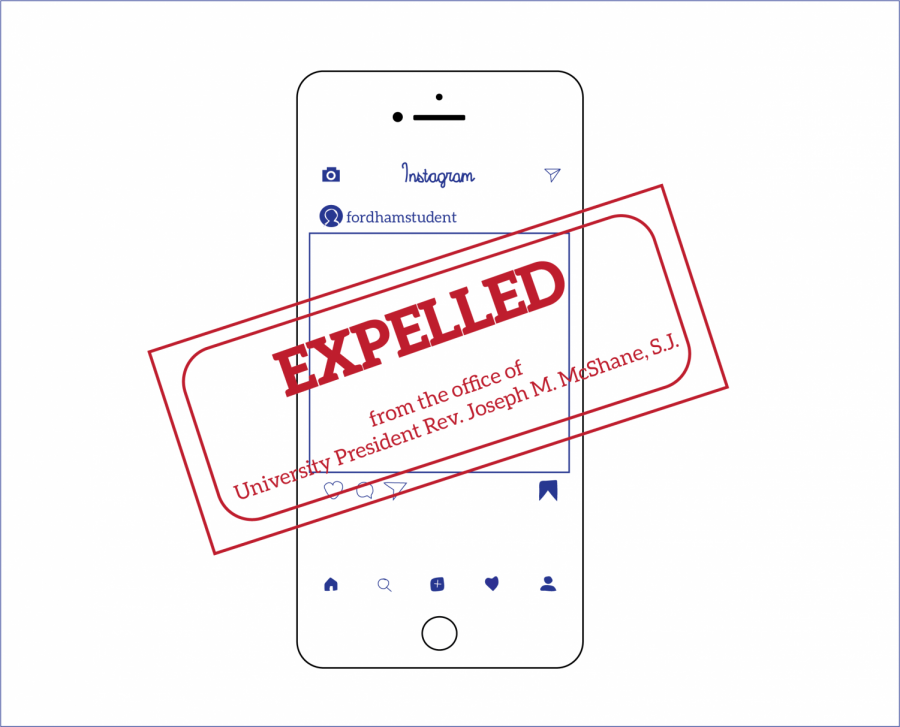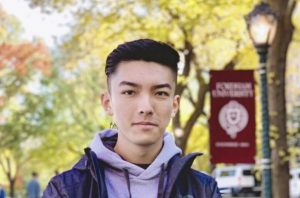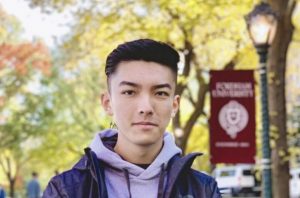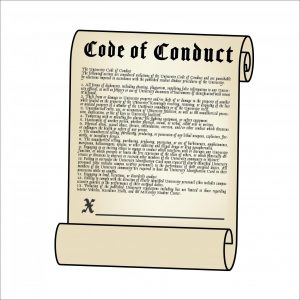Fordham Is in the Wrong on Austin Tong
A reluctant defense of a notorious Fordham student’s Instagram post
August 20, 2020
To be honest, I do not hold Austin Tong, Gabelli School of Business at Lincoln Center ’21, in very high regard. In fact, I would say that he is long overdue to face the music. In his time at Fordham, he has actively sabotaged the operations of the United Student Government, continually expressed discriminatory views and generally been an unpleasant person to know. I would even go so far as to say that I believe Fordham was right to investigate when yet another controversial Instagram post of Tong’s sparked unrest and fear among students. Unfortunately, however, the way they chose to handle the situation was completely incompetent.
Yes, in the context of the moment, it is eminently understandable how the politically active students of Lincoln Center would interpret a picture of Tong holding a rifle as dangerous. He has been outspoken about his opposition to the Black Lives Matter movement at a time when such opposition is often accompanied by threats of violence against protesters. It is therefore reasonable that Fordham would feel the need to reach out to Tong and address the issue. It’s at that point, however, that the justification for Fordham’s actions begins to break down.
There’s a difference between actively threatening speech and just being an insensitive tool, and unfortunately, the latter isn’t against the code of conduct.
Tong’s defense against the university’s censure is that he was simply celebrating his Second Amendment rights in light of the anniversary of the Tiananmen Square Massacre, and his case is admittedly very solid. His words and actions have been consistent with this narrative, even prior to the controversy — in fact, he clarified the meaning of the post even before the university stepped in. As a result, I expect that Fordham will have a very difficult time proving that his post met even its criteria for censure and will likely lose face by trying. There’s a difference between actively threatening speech and just being an insensitive tool, and unfortunately, the latter isn’t against the code of conduct.
What made Fordham decide to pursue punitive measures even after meeting with Tong, with the full knowledge of his nearly airtight rationale? After facing heavy criticism for its lax attitude toward discriminatory speech, was the university anxious to take the pressure off by making an example out of Tong? What could explain such a seemingly hasty and misguided decision — especially one that harmed the University’s reputation at a national level?
Of course, it’s possible that Fordham is simply too stubborn to back down, convinced that defending a losing position is better than admitting defeat to a mere student. Better to die on a hill than surrender, I suppose, even if it’s a really, really stupid hill. After all, Fordham has continued to appeal the court’s decision on the Students for Justice in Palestine club after losing that battle.
As amusing as such a flub would be, however, there could very well be negative consequences for that failure — beyond just Fordham’s lost face. A defeat at the courthouse for Fordham could set a precedent of nonintervention, allowing the university to claim that its hands are now tied. It would give Fordham an excuse to avoid the hassle of dealing with hate speech, shrugging off all but the most egregious violations with a “Well, we already tried.” Such a lax attitude may be hard to imagine, given the university’s relentless campaign against SJP, but a professor or student’s discriminatory comments are a lot easier to dismiss or ignore than a deliberately disruptive, critical and possibly university-funded club that draws outcry from donors and other institutions.
All in all, it’s sad to see that Fordham has once again dropped the ball. Not one of the nearly 10 recorded incidents involving racist and/or anti-Semitic imagery on campus since 2015 has resulted in similar consequences for a student. Even when leaked data from a neo-Nazi forum revealed the presence of a virulent, self-admitted white supremacist at Fordham, no student ever faced punishment. It took nationwide protests and social unrest to pressure Fordham administrators into actually prosecuting discriminatory speech on campus, and the first thing they did was pick a fight they can’t win. It’s a completely unforced error; they might as well have stepped on a rake. Austin Tong deserves to be held accountable for many of his words and actions — but, for God’s sake, not these.


















The Dude • Jan 28, 2021 at 6:01 pm
I used to consider myself a liberal. I used to vote straight down the left each election and I allowed myself to be convinced that Republicans/Conservatives were inherently wrong and hateful people. I was surrounded by liberals at my University and together we despised the Right with a passion and would stigmatize them like we did the poor saps who were forced to smoke cigarettes in tiny corners of the campus while students jeered and sneered as they walked by.
An interesting thing happened when I graduated and left college. I remember the exact moment I had my epiphany. People were standing outside the local Chick-fil-A with picket signs and screaming at people as the drove by. They were trying to get the restaurant shut down because its owner was a Christian who believed that same-sex marriage was immoral. I drove home and my mother-in-law was there visiting my wife and I brought up the protests. My MIL immediately jumped on the wagon and started condemning the restaurant and its owner. As I stood there listening to her rant about it I started thinking to myself: “Wait a minute… She sounds very close-minded and intolerant towards someone who has a different opinion based on their religion. I thought WE, the LEFT, were supposed to be all-inclusive and the tree-hugging hippies who promoted peace and love. You know, that whole ‘Coexist’ bumper sticker you see so much. Hating someone and trying to cancel them out simply because they had a religion that had different values sounded EXACTLY like those ‘horrible racist Republicans’ who feared Muslims because of their religion. You know, the ones us Liberals thought were the scum of the earth because of their lack of tolerating other cultures and ideals. I think I see a huge problem here.”
Ever since then, which was probably seven or eight years ago, I have continued to be horrified at the level of hypocrisy shown by those who I used to consider comrades. I, personally, have lost life-long friends and even family members by simply suggesting that we try to understand opposing viewpoints and not be so quick to crucify and cancel out those who don’t agree with us. I have been shunned and had my social media accounts bombarded with hate simply for stating things such as “I wish there were more truly objective news that wasn’t filled with biased content,” much like this “article.”
Y’all should take a good long hard look at yourselves in the mirror and be ashamed.
Sarah • Jan 20, 2021 at 7:11 pm
As a progressive myself, I am ashamed of the manner in which Fordham addressed this incident. Being progressive and/or liberal inherently means allowing for non coherence to the norm, even if the norm is progressive/liberal.
Also, the links purporting to prove Tong’s transgressions were not supportive of that premise in the least. The last one was particularly unnecessary.
Noah • Jan 15, 2021 at 12:55 pm
Reluctant Credit to the Authors of this Article (for their reluctance)
The tone of this article raises an important question: why so reluctant? Is that really fair? The grudging defense of Tong is a symptom of the phenomenon that drives the far-right persecution fantasy. The reason that there is so much outrage (being amplified by the NRA who has a nice feature ad running on youtube featuring Tong) is because there is a real problem of bias underlying the institutional response to right-wing ideology and the obvious double-standard toward left-wing ideology. As a result, even people who are making real effort to give an objective analysis of the situation can only seem to do it through gritted teeth.
It’s painful, but the authors of this article need to take a hard look at their own slant. They say that Tong “continually expressed discriminatory views,” but the linked post just shows someone accusing him of “making disparaging comments against Black Lives Matter activists and calling them hypocrites.” and a screenshot of Tong saying in a post that “‘Racism’ is just a way of silencing others in 2020.” To the first point, BLM is a political movement. It cannot be equated to all people of color. It does not represent all people oppressed by over-policing and the dysfunctions of the criminal justice system. It does not represent all black people in the U.S.. It is a complex coalition of disparate activists and it is certainly not above criticism. There is rank hypocrisy under the banner of BLM. Can you disprove or dismiss that? Criticizing that group and its supporters is not the same thing as silencing black voices or dismissing the pursuit of justice and equality- it is a targeted critique of a specific activist group. If you default to interpreting it as the former, that says more about you than it does about Tong. To the second point, “racism” has been used as a bludgeon to silence voices that are not woke enough for the left. There’s a savage code of conduct in the far left, and if you are not PC enough, the wolves will descend. Unless you are a complete ideologue, this is pretty evident. Once again, it is not a blanket denial that racism exists (note the quotation marks in Tong’s original post), but a critique of a tendency that should concern anyone who truly values discourse and free speech.
The authors state that, “There’s a difference between actively threatening speech and just being an insensitive tool, and unfortunately, the latter isn’t against the code of conduct.” Actually, there’s nothing unfortunate about it. Here’s what’s truly unfortunate: heads of academia are being swayed by left-leaning ideology to treat universities as places where everyone has a right to never be offended rather than the furious battlegrounds of competing ideas that they should be. Rather than engaging the ideology of the right on the level of discourse, biased decision makers are instead gradually and insidiously cancelling all right-leaning sentiment and branding it as fundamentally immoral. Tong is fighting back against that impulse in a case where it has clearly run amok, and his eventual victory (whether in court, in the university, or only in the minds of his ideological compatriots) will only serve to further tarnish the “pursuit of social justice” and its accompanying narrative.
I salute the writers of this article for going as far as they did, even though it seems that they must shroud their reasoned analysis with a cloak of reluctance. Whether genuine and organic or under the general duress of the broad anti-right sentiment endemic to academia, this reluctance is the next thing to be confronted.
Ted Vandeveer • Jan 9, 2021 at 3:51 pm
I have no problem with Fordham reaching out to a student after even a mildly concerning social media post in order to assure community safety or head off a problem early. But as the author points out, the school went way too far in this instance. The notion that schools may pick and choose the speech they agree with and censor and punish accordingly, is concerning to say the least. I have a high school senior who is applying to Fordham, and I’ve had the discussion with my senior where I have said “I’m not going to tell you that you can’t attend Fordham, but you need to think long and hard about a school that treats its students with dissenting viewpoints this way.”, and that “you also should question whether there is a racist response here, and would Fordham treat Black or Islamic students the same way?”.
Chase Kandon • Dec 6, 2020 at 9:07 pm
Yikes. No one proof read??
John Robinson • Nov 18, 2020 at 10:05 pm
Fordham University receives federal funds. The 1st amendment guarantees free speech. A student posing for a picture and making comments is completely protected from censorship by a campus. Fordham clearly is in the wrong. Last time I checked discriminatory views are also completely protected by the 1st amendment and anyone with decency who doesn’t believe in silencing views and censoring opinion like Stalin should find Fordham’s actions appalling. It’s your right to feel to anything about anyone for any reason. It’s also your right to express your. It is not Fordham’s right to violate free speech.
Matt • Nov 18, 2020 at 6:55 pm
Bunch of snowflakes getting offended in the comments. Geez, victim much?
Fact is, his passive aggressive dog whistles got picked up and he went and cried to the NRA to create fear based propaganda to fuel the conservative sheep.
He is a coward who needs a gun to feel safe. Weak mind.
Lisa • Nov 16, 2020 at 9:59 am
Basically, what this hit-piece, disguised as an “article”, is indented to do, is to demonize and discredit a conservative whom is a Trump supporter. That’s it. You can try all you want to, but it won’t work. The People are seeing through the lies they are fed daily, seeing who the enemies of the Nation are, are are becoming aware. This happening, thankfully, because of President Trump.
Brian Ferguson • Nov 13, 2020 at 7:42 pm
So…what is wrong with you people?. No freedom of speech at your college? Sad.
Jeff P • Nov 12, 2020 at 10:00 am
Credit where credit is due. At least you rationalized your way to the correct conclusion. You can have “hate speech” or you may have free speech. You should be mindful that they are mutually exclusive of one another.
Where you fail is that you lack Austin’s courage of conviction. You fear being denounced by the same mob mentality that attacks Austin from the safety of anonymity. You came to the right conclusion kid, now grow a pair and speak like a man. Without fear.
Bret Frankman • Oct 19, 2020 at 4:27 am
This article seemed very bias to me. I don’t like how you wrote YOUR opinions as if they were facts. You said for example “he is genuinely an unpleasant person”. Instead I you should say “In my opinion, he is a genuinely unlikable person”. But even then no one really cares about your opinion just stick to the facts. Dont go down the road of FOX and CNN style journalism.
James B • Sep 12, 2020 at 11:06 pm
Despite the obvious extreme left facing bias dripping from this piece you at least come up with the right answer. It was obviously very painful as you felt the need to continually interject your own baseless disparaging commentary in an attempt to character assassinate this young man who got it completely right. Your intellectually deficient assumption that he deserved any scrutiny in your summation is only supported with links to more dribble, from people siting around you, who wrote a bunch of faceless, nameless, anonymously sourced hearsay fitting of the CNN and MSDNC model. If they didn’t think at the time that stuff was written they could get away with pasting a name to it why do you now feel justified in trying to, and with no additional stated evidence of anything? We all get that he doesn’t agree with you on much of anything ….. and that’s the point …… he does’t have to in America nor does anyone else!
Yijia Liu • Sep 11, 2020 at 12:23 am
Showing compassion to the loss of human lives during the Tiananmen Square 1989, and feel blessed from the protection granted to us from our constitution…is being an “insensitive tool”? Or is he an “insensitive tool” because he prioritizes his mourning differs from the way you and your friends do?
mike • Sep 5, 2020 at 10:29 am
I read the linked information in the article about Austin Tong. Each link was to support the claim that Austin Tong is an unsavory sort: “sabotaging” operations of the student government (maybe actively resisted rather than sabotage?), expressing “discriminatory views” (huh?) and is “generally unpleasant” (because he went on Laura Ingram’s show?) If Austin Tong expressed the prevailing ideology of the university and students, his actions would be cast in a different light. He does not and they were not. Either way, nothing whatsoever provided as evidence of Austin Tong’s behavior at Fordham remotely supports the kind of reaction, much less censure, Tong has received by Fordham. If Fordham has credible evidence (that is, the kind of evidence that stands up in court) that Tong was breathing threats of violence against Fordham or its students, it would have been published. Tong is going to win in a big way in court. Fordham has already lost in the court of public opinion- another institution mismanaged by ninnies.
Francisco Pintado • Aug 27, 2020 at 7:01 pm
Oh imagine that. Leftists who don’t care about actual racism, but want to crucify someone who speaks out against BLM.
Could they just be Marxists defending a Marxist organization while indoctrinating kids with Marxism? Well, that would make more sense…
Dan • Aug 25, 2020 at 6:20 am
“There’s a difference between actively threatening speech and just being an insensitive tool, and unfortunately, the latter isn’t against the code of conduct.”
It sounds like the author is projecting themselves as an overly sensitive tool, and it makes sense going by this diatribe.
Christopher Smith • Aug 24, 2020 at 9:46 am
Aren’t you the guy who wrote “Silenced or Shouted Down” on July 31, in which you wrote that “what disaffected students like Austin Tong…fear most” is “[a]ccountability.” You we’re also critical of “I disapprove what you say, but I will defend to the death your right to say it,” in support of banning from campus speech you believe is harmful.
Well, your present position seems to be that the University, not Austin Tong, fears accountability and that although you disapprove of what Austin Tong says, you defend his right to say it.
Congratulations! In a few short weeks, you have seen the light!
Christopher Smith, Fordham Law, 1981
Dan • Aug 23, 2020 at 2:22 pm
The Boomers in the comments have me dying. I just wanted to say this article helped inform me, a recent graduate of Fordham who knew of Austin and because of his abysmal reputation automatically assumed he was in the wrong. I think Evan knows his audience well and helped me separate my opinion of Austin from the facts of the situation.
DH • Aug 22, 2020 at 1:59 pm
This article is painful to read. The authors lost all modes of persuasion (ethos, pathos, logos) by giving into their own emotions, all in an attempt to sound relevant (without sincerity).
Objectively, no institution (Government or University) should ever compel speech or punish any person for individual thought — period.
Feeling offended is an opportunity to bridge gaps. Not agreeing with someone is an opportunity to create dialogue. Both are an opportunity to heal and become better. Opportunities are not a requirement, and being offended is not on the list of “world problems.”
Go to Walgreens… In the first aisle on the left and at the very back is a product called, “ActRight”… buy you some, take you some so you can GetRight.
Ben McDonough • Aug 22, 2020 at 1:46 pm
Eventually students in this editorial staff will need to get a grip. As a teenager Tiananmen Square was a despicable day in human history. A blast against freedom. It woke me up to who is for us and who is against us. Now Hong Kong. My advice to the haters and doubters of Americas role on this planet would be for each student with a problem with the great U.S.A. would be to take a short one year overseas tour to their favorite communist/socialist country. Make it the time of your life. Learn and do as much as you can in these great countries. Please check in every 30 days with a report. After a year, if you still want to come back to America please do with a full report on your experience. I will personally take you to and from the airport in a luxurios Ultra- Stretch Limo. Ultimately you will decide which country for you to spend the rest of your life within. Please be sure to renounce your U.S citizenship as soon as possible. There are many who wish to take your place as the waiting list to become an appreciative productive member of society is long. Take good care of yourself now…
SIGNED: An appreciative and thankful U.S. citizen
Kevin Sorrentino • Aug 22, 2020 at 8:39 am
Even your own “reluctant” defender of Mr. Tong lacks the self awareness of his own bias in his excruciating attempt to prevent criticisms of an obvious leftist double standard. Defending Austin Tong does not require slandering the young man for the sake of preserving credibility with leftist readers. You defend Mr. Tong because his civil rights have clearly been violated. End of story. I hope these young people who blindly follow BLM and other Marxist organizations outgrow these disturbing anti-democratic proclivities. Is wearing a MAGA hat going to result in a visit by campus security because someone decided to “feel“ unsafe? Feeling unsafe and actually being unsafe are two completely different things. Please re-read the Bill of Rights.
It’s such an irony that as a gay man who owns a “Don’t Tread on Me” t-shirt (if you can’t understand why then you probably believe the United States began in 1619 rather than the correct date of 1776), I would avoid the Fordham campus altogether out of concern for being confronted by campus security.
M • Aug 22, 2020 at 5:41 am
I suppose the legal argument is weak, but when do you value the ethical over the technical? That’s ultimately the question. Like with SJP, known for frequent hate speech, deliberate Neo-Nazism, antisemitism, online harassment, bullying, gas-lighting, tactics of emotional abuse, and a case a sexual assault, should Fordham really not take a stand and go through with an appeal? Sure, it offers them no financial advantage, but is finance the only aim?
But a school shouldn’t just be a business. It should also be a home.
T Nails • Aug 21, 2020 at 12:42 pm
You really need to check your biases. Tong’s “controversial” appearance on the news poses what issue? He disagrees with the prevailing leftist sentiment? So what? It’s called discourse. You state: ” He has been outspoken about his opposition to the Black Lives Matter movement at a time when such opposition is often accompanied by threats of violence against protesters.” But he didn’t threaten anyone, so why mention it? Are you implying that opposition to BLM carries an implicit threat? That’s some magical thinking. Meanwhile, it’s well documented, violence and looting has been incited and defended by leaders of BLM (see Portland and Chicago last weekend) while they remain absolutely silent in the wake of David Dorn, Secoriea Turner, Lorne Ahrens, Officer Michael Krol, Officer Patrick Zamarripa, Officer Brent Thompson, all killed by BLM inspired murderers. Their silence leads to violence. The victims are mostly black.